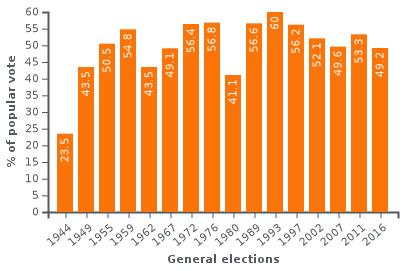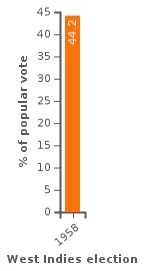People's National Party
The People's National Party (PNP) is a social-democratic[5][6][7] political party in Jamaica, founded in 1938 by activist Osmond Theodore Fairclough. It holds 30 of the 63 seats in the House of Representatives,[8] as 96 of the 227 local government divisions. The party is democratic socialist by constitution.[9]
People's National Party | |
|---|---|
_logo.svg.png) | |
| Leader | Peter Phillips |
| President | Peter Phillips |
| Chairperson | Fitz Jackson |
| Secretary | Julian Robinson |
| Founder | Osmond Theodore Fairclough |
| Founded | 1938 |
| Headquarters | Kingston, Jamaica |
| Youth wing | People's National Party Youth Organization |
| Ideology | Social democracy Democratic socialism Populism Republicanism[1] |
| Political position | Centre-left[2][3] |
| Regional affiliation | COPPPAL West Indies Federal Labour Party (1957–1962) |
| International affiliation | Socialist International (observer)[4] |
| House of Representatives | 30 / 63 |
| Senate | 8 / 21 |
| Local Government | 96 / 227 |
| Parish Councils | 4 / 13 |
| Website | |
| pnp | |
| Part of a series on |
| Organized labour |
|---|
 |
|
Labour movement
|
|
Academic disciplines |
The PNP uses the hatted head, the rising sun, the fist, the trumpet and the colours orange, red and yellow as electoral symbols.
The party is a member of COPPPAL and a Socialist International observer.[10] From 1957 to 1962, the party was a member of the West Indies Federal Labour Party in the Federal Parliament of the West Indies Federation.
History
The PNP was founded in 1938 by the Honourable Osmond Theodore Fairclough, and is the oldest political party in Jamaica. It is one of the country's main two political parties, and is considered more to the left than its main rival the Jamaica Labour Party (JLP). Fairclough recruited the PNP's first leader Norman Manley. The party held a majority of seats in the parliament of colonial Jamaica from 1955 until 1962. Following independence in 1962, it held the majority of seats in the Jamaican Parliament from 1972 to 1980, from 1989 to 2007, and from 2011 to 2016.
The PNP was defeated in the first universal elections held in Jamaica in 1944, winning only four of the 32 seats (one elected independent joined the party afterwards). It came to office again in 1955, and held office until just before independence in 1962. During this period of government, it promoted actively reformist social democratic policies, including opening secondary education to many poorer Jamaicans through state funding of scholarships.
Ten years later, under the leadership of Norman Manley's son Michael Manley, it returned to office committed to democratic socialism and a foreign policy focused on strengthening relations with the Global South. In 1980, after several years characterised by inflation and rising unemployment, the JLP led by Edward Seaga overwhelmingly defeated the PNP in a campaign noteworthy for its alarming level of violence. Manley led the party in a boycott of the snap election called in 1983. The party was absent from parliament for more than five years.
The PNP was returned to office under Manley's leadership in 1989. He retired from politics in 1992, and was replaced as party leader by P. J. Patterson. Patterson led the PNP to victory in 1993, 1997, and 2002, becoming the first political leader in Jamaican history to win three successive general elections. In the 2002 election, held on 16 October 2002, the party won 52.2% of the popular vote and 34 of the 60 seats in the House of Representatives.
On 26 February 2006, Portia Simpson-Miller was elected as Patterson's successor, becoming the first female president of the PNP, and became the Prime Minister of Jamaica. The PNP lost the August 2007 election to the JLP and its leader Bruce Golding.
In the 29 December 2011 general election, the PNP was returned to power with 42 of the 63 seats in Jamaica's parliament. At first, 41 seats were counted in favour of the PNP. A recount with official results cost the former agriculture minister, Christopher Tufton, his seat, putting the PNP at 42 and the JLP at 21.[11] On January 5, 2012, Portia Simpson-Miller was sworn in as Prime Minister for the second time in her political career. On the following day, she assigned 20 cabinet ministers to various ministries, and eight state ministers.
Political positions
The party adheres to social democracy and republicanism, and is an observer member of the Socialist International.
Electoral performance
House of Representatives

| Election | Leader | Votes | Share of votes | Seats | Result |
|---|---|---|---|---|---|
| 1944 | Norman Manley | 82,029 | 23.5% | 5 / 32 |
Opposition |
| 1949 | Norman Manley | 203,048 | 43.5% | 13 / 32 |
Opposition |
| 1955 | Norman Manley | 245,750 | 50.5% | 18 / 32 |
Government |
| 1959 | Norman Manley | 305,642 | 54.8% | 29 / 45 |
Government |
| 1962 | Norman Manley | 279,771 | 43.5% | 19 / 45 |
Opposition |
| 1967 | Norman Manley | 217,207 | 49.1% | 20 / 53 |
Opposition |
| 1972 | Michael Manley | 266,927 | 56.4% | 37 / 53 |
Government |
| 1976 | Michael Manley | 417,768 | 56.8% | 47 / 60 |
Government |
| 1980 | Michael Manley | 350,064 | 41.1% | 9 / 60 |
Opposition |
| 1983 | Michael Manley | Did not contest | |||
| 1989 | Michael Manley | 473,754 | 56.6% | 45 / 60 |
Government |
| 1993 | P.J. Patterson | 401,131 | 60.0% | 52 / 60 |
Government |
| 1997 | P.J. Patterson | 429,805 | 56.2% | 50 / 60 |
Government |
| 2002 | P.J. Patterson | 396,590 | 52.1% | 34 / 60 |
Government |
| 2007 | Portia Simpson Miller | 405,293 | 49.6% | 28 / 60 |
Opposition |
| 2011 | Portia Simpson Miller | 463,232 | 53.3% | 42 / 63 |
Government |
| 2016 | Portia Simpson Miller | 433,735 | 49.2% | 31 / 63 |
Opposition |
West Indies

| Election | Party Group | Leader | Votes | Seats | Position | Government | |||||
|---|---|---|---|---|---|---|---|---|---|---|---|
| No. | Share | No. | Share | ||||||||
| 1958[12] | WIFLP | Norman Manley | 382,525 | 44.2% | 5 / 17 |
29.4% | 2nd | WIFLP | |||
List of party presidents
- Osmond Theodore Fairclough Founder (1938)
- Norman Manley (1938–1969)
- Michael Manley (1969–1992)
- Percival James Patterson (1992–2006)
- Portia Simpson-Miller (2006–2017)
- Peter Phillips (2017–present)
References
- PNP Manifesto 2016
- Jean Grugel (1 January 1995). Politics and Development in the Caribbean Basin: Central America and the Caribbean in the New World Order. Indiana University Press. pp. 117–. ISBN 0-253-20954-4.
- Europa Publications (2 September 2003). Political Chronology of the Americas. Routledge. pp. 140–. ISBN 978-1-135-35653-8.
- "Member Parties of the Socialist International". Archived from the original on 3 May 2013. Retrieved 28 October 2011.
- Freedom House (1 November 2011). Freedom in the World 2011: The Annual Survey of Political Rights and Civil Liberties. Rowman & Littlefield. pp. 342–. ISBN 978-1-4422-0994-7.
- M. Keith Booker (2005). Encyclopedia of Literature and Politics: A-G. Greenwood Publishing Group. pp. 1–. ISBN 978-0-313-32939-5.
- John Girling (26 November 2010). America and the Third World: Revolution and Intervention. Routledge. pp. 196–. ISBN 978-1-136-85882-6.
- Parliament of Jamaica
- "Constitution of the People's National Party". Retrieved 28 January 2013.
- "Member Parties of the Socialist International". Archived from the original on 3 May 2013. Retrieved 28 October 2011.
- New 2012 Cabinet Ministers Archived 7 February 2012 at the Wayback Machine
- "Jamaica Observer Limited". Jamaica Observer. Retrieved 25 June 2020.
External links
- Official PNP website
- Jamaica New 2012 Cabinet Ministers
- Party manifesto (PDF file; free download of reader available here)
- History of the PNP and the JLP

